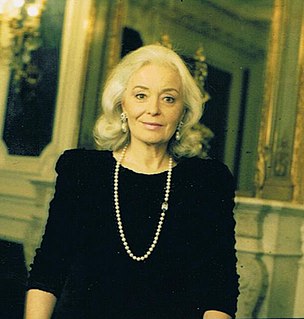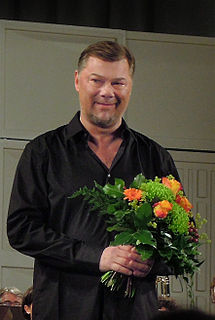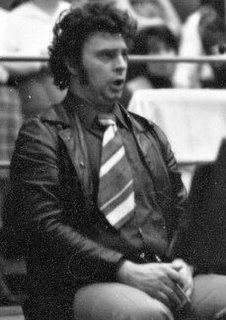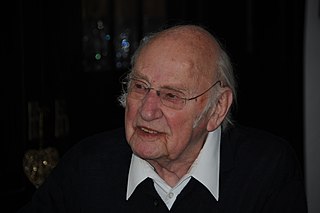Otto Schenk | |
|---|---|
 Otto Schenk in May 2013 | |
| Born | 12 June 1930 Vienna, Austria |
| Occupation | Actor, director |
| Years active | 1953–present |
| Spouse(s) | Renée Schenk |
Otto Schenk (born 12 June 1930, in Vienna) is an Austrian actor, and theater and opera director.
Otto Schenk | |
|---|---|
 Otto Schenk in May 2013 | |
| Born | 12 June 1930 Vienna, Austria |
| Occupation | Actor, director |
| Years active | 1953–present |
| Spouse(s) | Renée Schenk |
Otto Schenk (born 12 June 1930, in Vienna) is an Austrian actor, and theater and opera director.
Schenk was born to Catholic parents. His father, a lawyer, had Jewish roots and therefore lost his job after the Anschluss in 1938. His mother was Italian. [1] Schenk studied acting at the Max Reinhardt Seminar, and started his acting career at the Theater in der Josefstadt and the Wiener Volkstheater, and as a comedian at Vienna's Kabarett Simpl. His directing career began in 1953 at small Viennese venues, later leading him to renowned stages like the Burgtheater, the Munich Kammerspiele or the Salzburg Festival, staging plays by William Shakespeare, Arthur Schnitzler, Ödön von Horváth, Anton Chekhov. In 1957, Schenk directed his first opera, Mozart's The Magic Flute for the Salzburg Landestheater. His breakthrough as an opera director came in 1962 with Alban Berg's Lulu at the Theater an der Wien. This production was later moved to the Vienna State Opera, where Schenk debuted in 1964 with Leoš Janáček's Jenůfa . He was contracted by the State Opera as a permanent producer for several seasons, while continuing his free-lance career as an actor, comedian and director in Austria and Germany, working for theaters, opera houses and television productions. In 1965 Austrian television engaged him to direct a studio production of Verdi's Othello sung in German with a stellar cast. During the 1970s and 1980s, Schenk was hired by La Scala, the Royal Opera House in Covent Garden, and German opera houses such as the Berlin State Opera, the Bavarian State Opera and the Hamburg State Opera. Schenk's operatic productions included works by Mozart, Gaetano Donizetti, Giuseppe Verdi, Antonín Dvořák, Giacomo Puccini, Richard Strauss, Richard Wagner, Ernst Krenek, and Friedrich Cerha.
In the United States, Schenk is especially known for his lavish, realist, traditionalist stagings at the Metropolitan Opera, most notably his production of Richard Wagner's four-opera epic Der Ring des Nibelungen which was hailed by traditionalist Wagnerian opera fans as one of the closest productions to Wagner's true vision. The production was retired from the Met in 2009. Schenk had debuted at the Met with Puccini's Tosca in 1968; his 2006 farewell production was Donizetti's Don Pasquale with Anna Netrebko.
Schenk has appeared in over 30 films (mostly in German). In 1973, he directed Reigen , a film based on Arthur Schnitzler's Reigen (with Helmut Berger, Sydne Rome, Senta Berger). Schenk also starred in the stage adaptation of Lily Brett's Chuzpe at the Kammerspiele Theatre in Vienna. [2]
The Metropolitan Opera currently uses his productions of Die Meistersinger von Nürnberg , Tannhäuser , Arabella , and Don Pasquale . Many of his productions are available on DVD, including his Vienna State Opera productions of Fidelio and Rosenkavalier, and his Met productions of Parsifal, Die Meistersinger von Nürnberg, Tannhäuser and Der Ring des Nibelungen . In October 2010, Schenk returned to the Met to revive his Don Pasquale with Netrebko. In December 2010, he revived his Rosenkavalier (conducted by Asher Fish, cast including Adrianne Pieczonka) at the Vienna State Opera. [8]

Theo Adam was a German operatic bass-baritone and bass singer who had an international career in opera, concert and recital from 1949. He was a member of the Staatsoper Dresden for his entire career, and sang at the Bayreuth Festival from 1952 to 1980. He particularly excelled in portraying roles by Richard Wagner, especially Wotan in Der Ring des Nibelungen, which he also performed at the Metropolitan Opera, among others. In concert, he was a much admired Bach singer and also drew acclaim for his interpretation of the title character of Mendelssohn's Elijah. He was a voice teacher at the Musikhochschule Dresden.

Cheryl Studer is an American dramatic soprano who has sung at many of the world's foremost opera houses. Studer has performed more than eighty roles ranging from the dramatic repertoire to roles more commonly associated with lyric sopranos and coloratura sopranos, and, in her late stage, mezzo-sopranos. She is particularly known for her interpretations of the works of Richard Strauss and Richard Wagner.

Dame Gwyneth Jones is a Welsh operatic dramatic soprano, widely regarded as one of the greatest Wagnerian sopranos in the second half of the 20th century.

René Pape is a German operatic bass. Pape has received two Grammys, was named “Vocalist of the Year” by Musical America in 2002, “Artist of the Year” by the German opera critics in 2006, and won an ECHO award in 2009.
Otto Edelmann was an Austrian operatic bass.

Johan Botha was a South African operatic tenor.

Bernd Weikl is an Austrian operatic baritone, particularly known for his performances in the stage works by Richard Wagner. He also has written books and directed operas.
Éva Marton is a Hungarian dramatic soprano, particularly known for her operatic portrayals of Puccini's Turandot and Tosca, and Wagnerian roles.

Franz Mazura was an Austrian bass-baritone opera singer and actor. He performed at the Bayreuth Festival from 1971 for 25 years and at the Metropolitan Opera for 15 years. He was made a Kammersänger in 1980 and an Honorary Member of the Nationaltheater Mannheim in 1990. He most often played villains and strange characters, with signature roles including Klingsor in Wagner's Parsifal. Mazura took part in world premieres, such as the double role of Dr. Schön and Jack the Ripper in the world premiere of the completed version of Alban Berg's Lulu at the Paris Opera in 1979, and as Abraham in Giorgio Battistelli's Lot in 2017. Two of his recordings received Grammy Awards. His voice was described as with dark timbre, powerful and like granite, with perfect diction. His acting ability was described as "well-supplied with vivid imaginative touches, whether deployed in comic roles or characters of inexorable malevolence. Mazura could achieve more impact with a lifted eyebrow or a belligerently thrust chin than many artists could with a ten-minute monologue." He had a long career, appearing at the Staatsoper Berlin the night before his 95th birthday.

Rachel Willis-Sørensen is an American operatic soprano.
Berislav Klobučar was a Croatian opera conductor. He conducted the Vienna State Opera for more than four decades, and guest conductor at the Bayreuth Festival.
Albert Dohmen is a German operatic bass-baritone who is known internationally for performing leading roles by Richard Wagner and Richard Strauss. He has also worked in concert halls and given lieder recitals.
Günther Groissböck is an Austrian operatic bass. Anthony Tommasini, chief classical music critic for The New York Times, described Groissböck's "imposing and good-looking" portrayal of Baron Ochs in Der Rosenkavalier at the Metropolitan Opera, New York, as "a revelation". James Jorden of the New York Observer praised Groissböck's "innovative take" on the role and his "big, virile sound". A 2018 recording of the Met performance was nominated for Grammy Award in the Best Opera Recording.

James Levine's 25th Anniversary Metropolitan Opera Gala was a concert, lasting approximately eight hours, that the Metropolitan Opera staged in 1996 in honour of its then principal conductor and artistic director. Excerpts from the gala were released by Deutsche Grammophon on a 72-minute CD, a 161-minute VHS videocassette and a 161-minute double Laserdisc in 1996, and on a 293-minute double DVD in 2005.
Hermann Wiedemann was a German operatic baritone and academic teacher. He was a long-term member of the Imperial Court Opera in Vienna from 1916, where he appeared as Faninal in Der Rosenkavalier by Richard Strauss 196 times, and as Beckmesser in Wagner's Die Meistersinger von Nürnberg 155 times. He was Beckmesser also in a recording from the Salzburg Festival 1937, conducted by Arturo Toscanini. He performed internationally at leading opera houses and festivals, such as the Teatro Colón of Buenos Aires and the Zoppoter Festspiele. He appeared in the world premieres of Wolf-Ferrari's I gioielli della Madonna in Berlin, Busoni's Die Brautwahl in Hamburg, and Lehár's Giuditta in Vienna.
Michael Kraus is an Austrian operatic baritone.
Gottfried Hornik is an Austrian operatic baritone and voice teacher. He was a member of the Vienna State Opera for 25 years and appeared worldwide in leading roles. His signature role was Beckmesser in Wagner's Die Meistersinger von Nürnberg. He was awarded the title of an Austrian Kammersänger.

Clemens Unterreiner is an Austrian operatic baritone. He is professionally active internationally as well as a soloist and ensemble member of the Vienna State Opera. His operatic repertoire ranges from lyric to German-Italian-French cavalier and heroic baritone roles to masses, oratorios and classical Lieder, and also includes operetta and modern music.
Erich Witte was a German stage actor, operatic tenor and opera director. He was based for almost five decades at the Berlin State Opera, and performed leading roles at major opera houses in Europe and at the Metropolitan opera. He participated in world premieres, including Louise Talma's Die Alkestiade and Alan Bush's Joe Hill.

Hans Clemens was a German tenor who had an international career in opera and concert from the 1910s through the 1930s. He performed with several major opera houses, including the Städtische Oper in Berlin and the Metropolitan Opera. He is particularly remembered for his performances and recordings of Wagner's David in Die Meistersinger von Nürnberg and Mime in Der Ring des Nibelungen. After retiring from the stage, he worked as a voice teacher in Los Angeles.